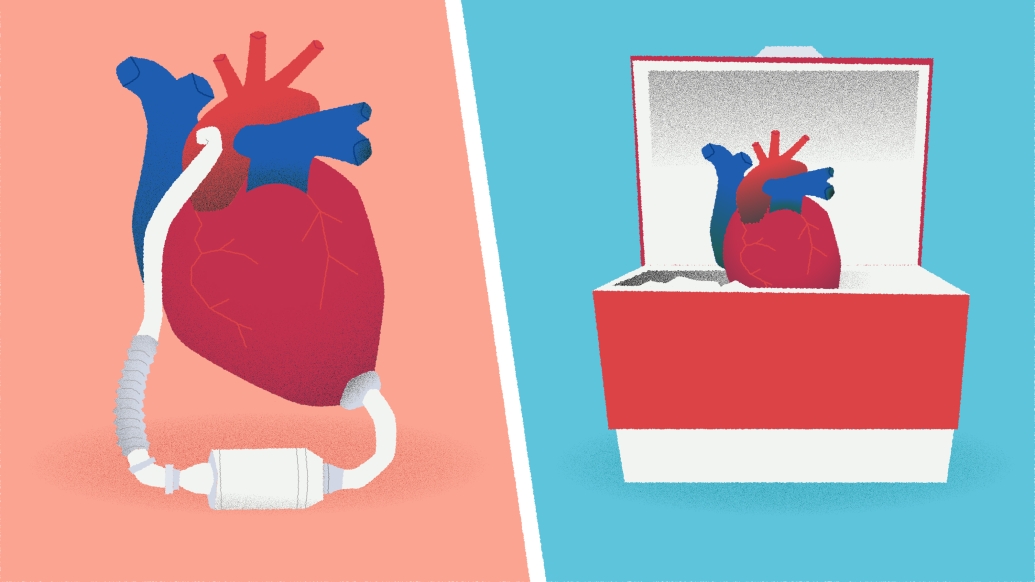Patients seen at transplant centers had almost 80% higher odds to receive “bridge-to-transplant” designation
8:49 AM
Author |

A change to Medicare policy surrounding heart transplant may lead to increased inequities in access to transplant for patients with heart failure, a Michigan Medicine study finds.
When a patient has severe heart failure, both a heart transplant and left ventricular assist device, which is implanted to assist the heart in improving blood circulation throughout the body, can be lifesaving. While LVADs continue to improve, heart transplant remains the gold standard therapy for end-stage heart failure.
In the United States, there are many health centers that implant LVADs but don’t perform transplants. Recognizing improved outcomes for patients with LVADs, the Centers for Medicare & Medicaid Services revised its national coverage decision in a manner expected to increase access to the life-altering devices. Starting in 2020, patients receiving an LVAD at a center not capable of transplant no longer needed permission from a Medicare-approved transplant center authorizing it if the patient was a transplant candidate.
SEE ALSO: Her heart stopped more than 25 times. ECMO saved her life
While the relaxed requirements have the potential to increase access to LVADs for patients with heart failure, a study published in JAMA Network Open finds that patients receiving LVADs at transplant-capable centers had 79% higher odds to receive a bridge-to-transplant designation than patients treated at LVAD-only centers.
This Medicare policy change may have the unintended consequence of further increased inequities in access to heart transplant for patients who are treated at centers that don’t perform transplant, said senior author Thomas Cascino, M.D., a cardiologist at the University of Michigan Health Frankel Cardiovascular Center and a clinical instructor in the Division of Cardiovascular Disease at U-M Medical School.
“Our study shows that this disparity existed before the policy change, and we think it will likely grow larger now that there is less collaboration,” Cascino said. “Being cared for at a center that does not perform heart transplant should not result in a lesser chance to receive a heart transplant.”
SEE ALSO: Life with a Ventricular Assist Device: A Nurse Answers Common Questions
Over two years, 25.6% of patients who received an LVAD at a transplant center eventually received a heart transplant, compared to just under 12% at LVAD-only centers.
An additional change impacting the disparity, Cascino notes, is a 2018 policy change made by the United Network for Organ Sharing that, while made with the goal prioritizing those at highest risk of death on the waiting ling, made it much less likely for patients receiving LVADs to receive a heart transplant unless urgent complications arose.
“The heart allocation system change has created a reality in which durable LVADs are much less likely to be a bridge to the best therapy — transplant — in the current system,” he said. “This puts the onus on the transplant community to select appropriate LVAD and transplant candidates during the initial evaluation. We need a system in which any patient can walk into the same hospital and get the right therapy for them.”
Live your healthiest life: Get tips from top experts weekly. Subscribe to the Michigan Health blog newsletter
Headlines from the frontlines: The power of scientific discovery harnessed and delivered to your inbox every week. Subscribe to the Michigan Health Lab blog newsletter
Like Podcasts? Add the Michigan Medicine News Break on Spotify, Apple Podcasts or anywhere you listen to podcasts.
Additional authors include Jeffrey S. McCullough, Ph.D., Xiaoting Wu, Ph.D., Michael J. Pienta, M.D., M.Sc., James W. Stewart II, M.D., Robert B. Hawkins, M.D., M.Sc., Alexander A. Brescia, M.D., M.Sc., Ashraf About el ela, M.D., Min Zhand, Ph.D., Pierre-Emmanuel Noly, M.D., Ph.D., Jonathan W. Haft, M.D., Monica Colvin, M.D., Keith D. Aaronson, M.D., M.S., Francis D. Pagani, M.D., Ph.D., Donald S. Likosky, Ph.D., all of University of Michigan, Jennifer A. Cowger, M.D., M.S., Henry Ford Hospital.
This project was supported in part through funding from the University of Michigan Health Department of Cardiac Surgery and by funding from the National Institutes of Health, National Heart, Lung, and Blood Institute.
Paper cited: “Comparison of Evaluations for Heart Transplant Before Durable Left Ventricular Assist Device and Subsequent Receipt of Transplant at Transplant vs Nontransplant Centers,” JAMA Network Open. DOI: 10.1001/jamanetworkopen.2022.40646

Explore a variety of healthcare news & stories by visiting the Health Lab home page for more articles.

Department of Communication at Michigan Medicine
Want top health & research news weekly? Sign up for Health Lab’s newsletters today!





